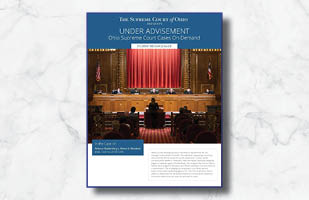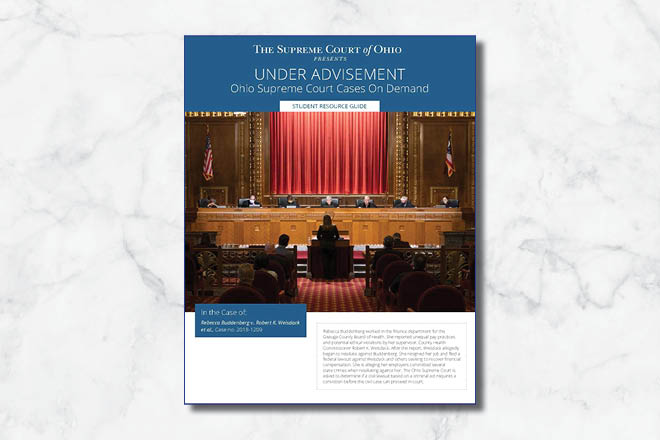Real Case Teaches About Justice System

The “Under Advisement” series helps students and teachers better understand the work of Ohio’s courts, specifically the Supreme Court.

The “Under Advisement” series helps students and teachers better understand the work of Ohio’s courts, specifically the Supreme Court.
The Supreme Court of Ohio has unveiled a new civic education course, which follows a case through the state’s judicial system.
“Under Advisement: Ohio Supreme Court Cases on Demand” is a set of resources to help educators teach about the Supreme Court and what kind of cases arrive at the state’s high court as set forth in Article IV, Section 2 of the Ohio Constitution.
The tools within Under Advisement contain primary documents, including legal briefs and video recordings of oral arguments. A review of the facts, descriptions of each side’s arguments, and a summary of the Court’s ruling in the case are incorporated in the materials, which are written to high school reading levels. All the content is aligned with Ohio’s learning standards for High School American Government curriculum. The latest case is the fourth in the series.
Rebecca Buddenberg v. Robert K. Weisdack et al. explores whether a civil lawsuit based on an alleged crime requires a conviction before the civil suit can move forward. The appeal relies on two statutes in the Ohio Revised Code, which is the collection of laws passed by state lawmakers and organized by topic. In this case, the laws up for debate are R.C. 2307.60 and R.C. 2921.03.
The Buddenberg lesson plan is the second featuring a civil case. The other – County of Wayne al. v. Ricky Baker, administrator – analyzes if R.C. 2744.02 protects a county from a negligence lawsuit after a fatal car crash. The incident happened on a road that was repaved days earlier.
Two additional lesson plans in the series feature criminal cases:
- State of Ohio v. Jaonte D. Hairston examines the Fourth Amendment to the U.S. Constitution as to whether police officers had reasonable suspicion to stop a man after hearing gunshots.
- City of Cleveland v. Benjamin S. Oles determines if law enforcement is required to provide Miranda warnings to a suspect being questioned in the front seat of a police vehicle, citing violations of the Fifth Amendment to the U.S. Constitution and Article I, Section 10 of the Ohio Constitution.
Materials for each case include educator and student resource guides, which are available through the Court’s website. The educator resource guides are password protected with an easy process for teachers to request access.
Additional civic education materials can be found on the Judicial Branch Education Resources page of the website.
For questions, contact the Civic Education staff by email or at 614.387.9223.


